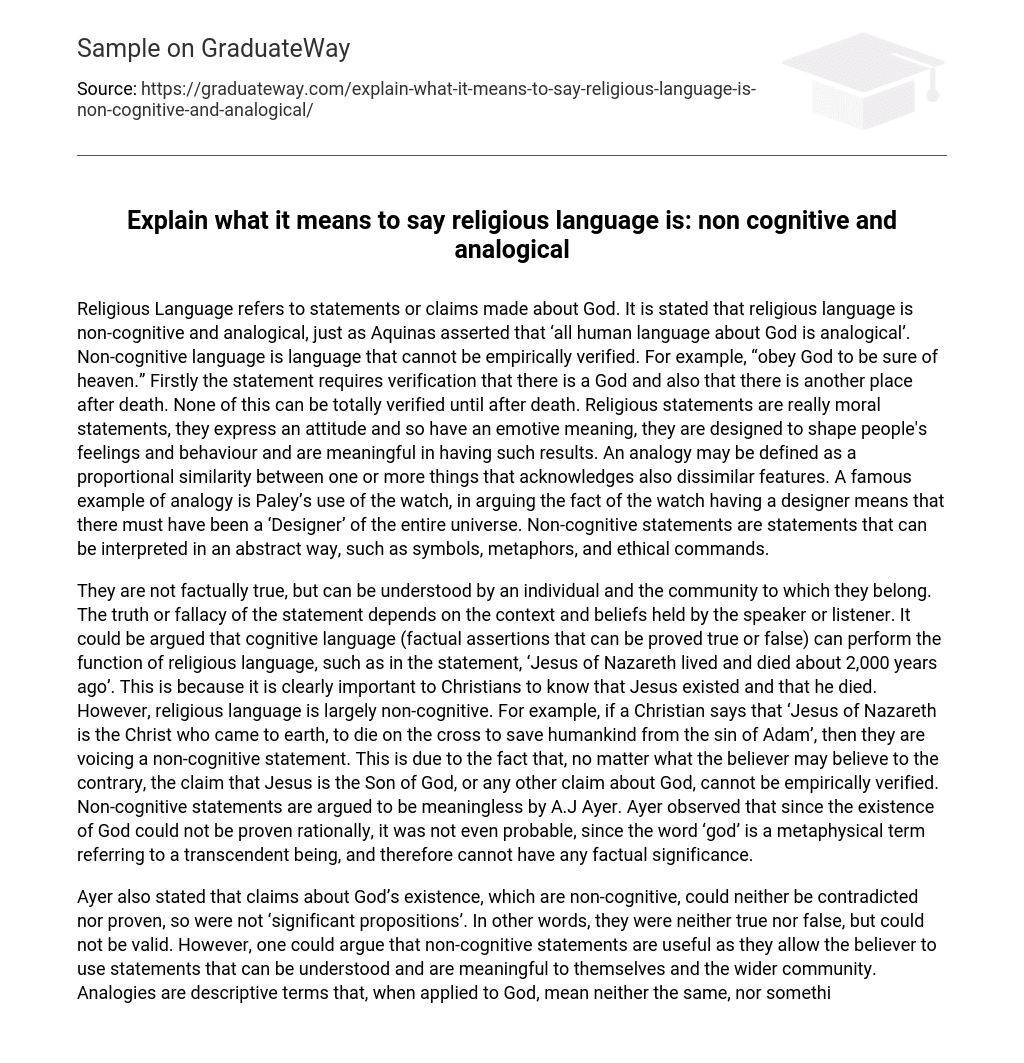Religious Language refers to statements or claims made about God. It is argued that religious language is non-cognitive and analogical, similar to Aquinas’ belief that all human language about God is analogical. Non-cognitive language cannot be empirically verified. An example of this kind of statement would be “obey God in order to ensure heaven.” This statement requires verification of the existence of God and an afterlife, which can only be fully confirmed after death. Religious statements essentially express a moral standpoint, conveying an attitude and carrying emotional significance. Their purpose is to shape individuals’ emotions and behavior, leading to meaningful outcomes. Analogies are used to establish a proportional similarity between things while also acknowledging their dissimilar aspects. A well-known illustration of this concept is Paley’s use of the watch as an analogy, where the presence of a designer for a watch implies a “Designer” for the entire universe. Non-cognitive statements can be interpreted in an abstract manner through symbols, metaphors, and ethical commands.
The accuracy of these statements may be subject to debate, but they can still be understood in individual and community contexts. Whether they are true or false depends on the beliefs of the speaker or listener. Cognitive language, consisting of provable facts, can serve a religious purpose. For Christians, it is crucial to acknowledge that “Jesus of Nazareth lived and died around 2,000 years ago” as it confirms his existence and death. However, religious language primarily operates on a non-cognitive level. When a Christian asserts that “Jesus of Nazareth is the Christ who came to earth, sacrificed himself on the cross to redeem humanity from Adam’s sin,” they are making a non-cognitive statement. This is because beliefs regarding Jesus being the Son of God or any claims about God cannot be empirically verified regardless of believers’ thoughts. A.J Ayer argues that non-cognitive statements lack meaning. According to Ayer’s observation, since there is no rational evidence for God’s existence and “god” refers to an transcendent metaphysical entity with no factual significance, its likelihood seems unlikely.
According to Ayer, claims about the existence of God that are non-cognitive lack significance as they cannot be contradicted or proven and therefore do not possess truth value. Nonetheless, it can be contended that non-cognitive statements still hold utility as they enable believers to employ meaningful statements comprehensible to both themselves and the broader community. Analogies serve as descriptive terms with distinct interpretations when applied to God versus humanity, yet still convey insights into God’s relationship with humankind. These analogies find use in religious language to articulate what cannot be adequately expressed through univocal and equivocal language where words have a singular meaning.
Applying this approach to religious language poses challenges as it humanizes God, as seen when the word ‘love’ is used to describe both a spouse and God. However, it’s important to note that this isn’t accurate since God is distinct from the created world. On the other hand, using equivocal language involves using the same word with different meanings. The drawback of equivocal language is that it becomes difficult to understand what is being conveyed about God due to the absence of a universal understanding, even though statements about him must hold significance.
Peter Cole proposed that analogy serves as a ‘compromise’ between univocal and equivocal language. There are two types of analogy suggested. The first type is an analogy of proportion, which implies that we can infer a connection between God’s attributes and our comprehension of their meaning. Brian Davies provides an illustrative example by comparing it to a mirror. He explains that when there is light present, a mirror reflects whatever stands before it, creating its own image; however, this image has been caused by something else.
The application of this example to God suggests that human beings exist because God is the cause of their existence. Another type of analogy, called analogy of attribution, aims to establish a relationship between certain human qualities like goodness, wisdom, and beauty and God’s nature. Essentially, it implies that these human qualities are derived from God’s own nature.
To illustrate this concept, Aquinas used the illustration of a bull. He noted that just as one can determine the health of a bull by examining its urine, one can understand the true nature of God by studying human beings. This is because many human characteristics stem from God’s nature and therefore reflect Him.
In addition, David Hume stated: “Wisdom, thought, design, knowledge – we attribute these to Him because they hold honor in human society and we lack any other language through which we can express our admiration for Him.” Hume suggests here that analogies allow us to comprehend and connect with God since understanding what it means to love humanity enables us to grasp the nature of God’s love.
The main advantage of using analogy to convey information about <God> is that it allows believers to affirm <God’s> transcendent nature while also maintaining the belief that humans can have a meaningful relationship with Him. However, there are weaknesses in this approach. For instance, believers want to understand <God> with language, yet simultaneously claim that He is beyond human comprehension. Additionally, since we do not actually know what <God> is like, it is uncertain if analogies establish an adequate relationship between the terms we use and <God>, which is the aim of using analogies.
Despite these limitations, analogy remains an effective method for conveying information about <God> as it allows us to compare the concept of <God> and His relationship with humans to a concept that we can comprehend. In summary, religious language must be non-cognitive as it cannot be empirically verified since [<God>] is not a part of the created order. It must also be analogical, as believers can only convey true information about [<God>] by comparing Him to a concept understandable to humans.





